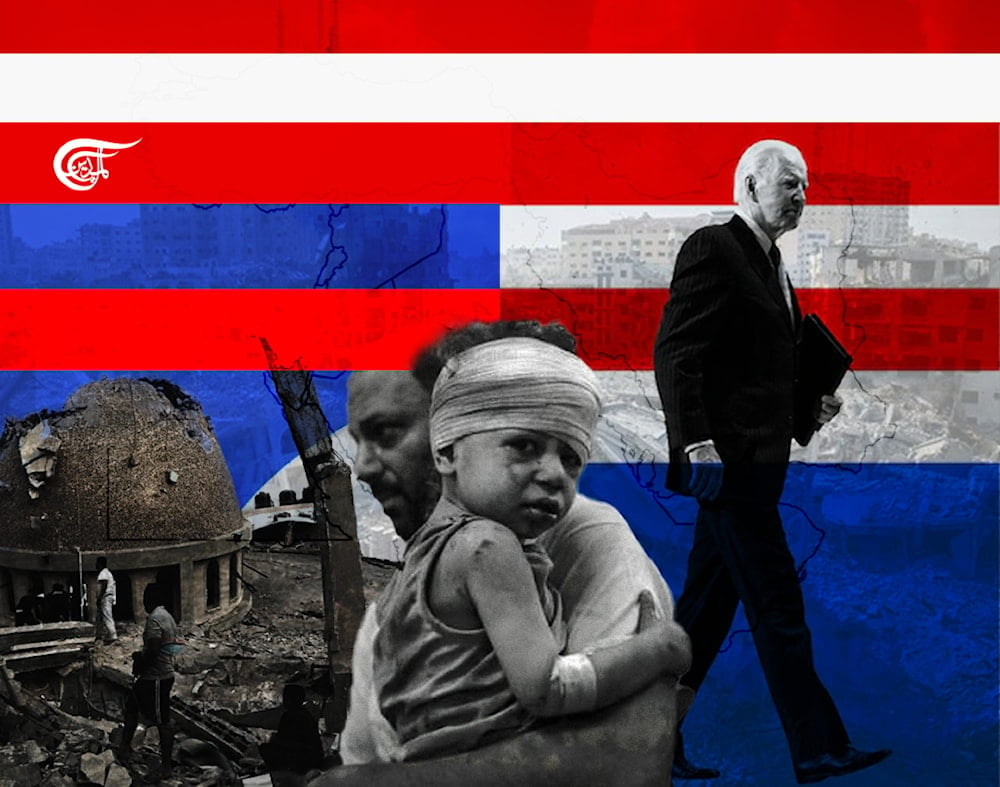At the Crossroads: A Palestinian American's reflection on the deafening silence of the Democratic Party and the quest for genuine political alignment
As I navigate the complexities of this dual identity, the political landscape of the United States becomes a crucial arena where my beliefs and values intersect with the broader narrative of American democracy.
-

The deafening silence of the Democratic Party (Illustrated by Arwa Makki; Al Mayadeen English)
In the vast tapestry of my identity, I find myself intricately woven into the rich threads of being an Arab American, and more specifically, a Palestinian American. It is a heritage marked by resilience, an unyielding spirit, and an unwavering commitment to justice. As I navigate the complexities of this dual identity, the political landscape of the United States becomes a crucial arena where my beliefs and values intersect with the broader narrative of American democracy.
For years, I embraced the democratic ideals that promised inclusivity, empathy, and a commitment to diplomacy. The Democratic Party, with its emphasis on social justice and human rights, seemed like a natural ally for someone who identifies with a community that has endured the harsh realities of displacement and conflict. However, recent events have cast a shadow over this allegiance, prompting a profound reevaluation of my political convictions.
The turning point was the realization that the Democratic Party, despite its rhetoric, has been complicit in perpetuating conflicts across the Middle East. The names of countries echo like a somber drumbeat: Yemen, Syria, Iraq, Libya, Lebanon, and, most heartbreakingly, Palestine. As an Arab American, these are not just distant lands on a map; they are the lands of my ancestors, the echoes of my history, and the stories etched into my identity.
Yemen stands as a testament to the failure of the Democratic Party to uphold the principles of peace and diplomacy. The devastating war, fueled by US support for the Saudi-led coalition, has led to unimaginable suffering and a humanitarian crisis of staggering proportions. It is a stark reminder that the party I once believed in has prioritized geopolitical interests over the lives of innocent civilians.
Syria, Iraq, and Libya bear the scars of ill-fated interference, which was once sanctioned by Democratic administrations. Their aftermath has been marked by instability, extremism, and the displacement of countless individuals who now bear the heavy burden of shattered lives and shattered dreams. It is a bitter pill to swallow, acknowledging that the party I once trusted has been a willing participant in the chaos that unfolded in the wake of these interventions.
Lebanon, a country with a history as complex and resilient as its people, has faced its share of challenges. The Democratic Party's approach to Lebanon has been marred by a lack of nuance, failing to recognize the delicate balance required to navigate the intricate web of sectarian politics. The consequences of this oversimplification are felt by the Lebanese people who yearn for stability and a future free from external interference.
And then there is Palestine, the heart of my identity. The Democratic Party's stance on Palestine has been a source of profound disappointment. The lip service paid to the "two-state solution" feels hollow when the party continues to provide unwavering support to "Israel", even in the face of human rights abuses and blatant violations of international law. The images of Palestinian families being forcibly displaced, of children bearing the brunt of a war they did not choose, haunt my conscience.
What troubles me even more is the deafening silence that emanates from the Democratic Party when it comes to advocating for a ceasefire in the face of Palestinian suffering. The party that claims to champion justice and equality falls silent when it matters most, betraying the very values it purports to uphold. As a Palestinian American, it is no longer tenable for me to align myself with a party that fails to prioritize the lives and well-being of my people.
In this moment of reflection, I find myself at a crossroads. The party I once believed in has proven to be a harbinger of war, a participant in conflicts that have left a trail of destruction in their wake. The democratic principles that drew me in have been overshadowed by a pragmatism that sacrifices moral integrity on the altar of geopolitical expediency.
As I navigate this political reawakening, I am acutely aware of the responsibility that comes with my vote. No longer can I cast my ballot based on blind allegiance; instead, I must scrutinize the actions and policies of those who seek to lead. The Democratic Party's track record in the Middle East has left an indelible mark on my consciousness, and I can no longer ignore the dissonance between its rhetoric and its actions.
My journey as an Arab American, and particularly as a Palestinian American, has led me to a profound realization: political allegiance must be earned, not assumed. The Democratic Party, in its current state, has lost my trust. As I look toward the future, I am compelled to explore alternative avenues, to seek leaders who prioritize diplomacy over war, empathy over expediency, and justice over geopolitical calculations.
In this pivotal moment, I am reminded that the power of the people lies not only in their ability to vote but in their capacity to hold those in power accountable. The narrative of my political journey is still unfolding, and as I navigate the complexities of my identity, I am determined to align my convictions with actions that reflect the values I hold dear. The road ahead may be uncertain, but it is a road I tread with a newfound sense of agency and a commitment to a vision of justice that transcends political affiliations.

 Mona Siam
Mona Siam
 5 Min Read
5 Min Read











